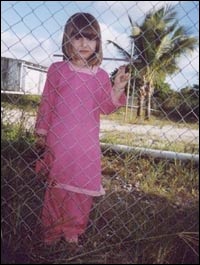I have met many different refugees over the last few years and many of their names and stories blur together. But among them all, a few particular people or families stick in my mind. One such person was a man called Ali Sarwari and his family. Back at the start of 2004, just after my second visit to Nauru, I wrote about their experience, which you can read in detail here. I think it’s worth reading, but I will repeat some of it here.
The first time I visited the detention centres on Nauru was in mid 2003. There were over 350 of them there at that time, and all of them had been in detention since 2001. Ali’s wife and daughter were among the many refugees I met.
They were one of nine mothers and their children in the Nauru camp whose husbands and fathers were in Australia, recognised as refugees. But because the women and children had arrived separately to the men, their refugee claims were considered completely separately by the Immigration Department and they had all been rejected.
Advertisement
The men living in Australia were only entitled to temporary visas and so had no family reunion rights, while their wives and children were locked up on Nauru and being regularly pressured by the Australian government to return to either Afghanistan or Iraq - the same place that the men had been found to have a legitimate fear of persecution.
It doesn’t take much to imagine the trauma those nine men had to endure, living freely - if insecurely - in Australia, while their wives and children were locked up on Nauru and under threat of being forced back alone to an unsafe homeland. Yet the Immigration Department remained intransigent in their refusal to reunite these families.
In Nauru in 2003 I met with all the women and children in this situation, as well as many of the other refugees there. For some reason, Ali’s six-year-old daughter Sakina stuck in mind, perhaps because I found it so hard to explain to her when she asked why she couldn’t see her father, who I had already met prior to leaving.
It’s a bit hard to explain, but every now and then when I feel there are a lot of cases and people who are seeking help, I single out one person in my mind as a sort of talisman. While I keep trying to help everyone I can, I think especially about that one person - “I will do all I can to get you out” - and at the same time hope that many others might also get pulled along in their wake.

Sakina was that person from that 2003 trip - helped perhaps by a photo we had of her looking out through the wire fence of the camp on Nauru.
Advertisement
Near the end of 2003 came the wonderful news (brought about more through the work of the UNHCR than anything I did) that New Zealand would take all of the nine families in Ali’s situation. Along with Sakina, Ali Sarwari was also memorable, as he was one of those people who stood out as clearly being capable and resourceful, as well as a genuinely lovely guy. His photo and story was run in The Age newspaper in late 2003, detailing how the only way a skilled, hard working refugee could see his family was to leave the country.
I met him in Melbourne not long before he left for New Zealand. I just recalled that he had insisted on giving a rug to both me and one of my staff, even though there were others who had achieved more for him. They were good quality Persian rugs too. Ali’s carpet is the first thing I stand on each morning when I get out of bed.
On the way back home from my second Nauru visit in early 2004, I was able to go via New Zealand and visit them in their new home in Hamilton, just south of Auckland - joined by another family who had been through the same experience. It is always wonderful, when you have seen people despairing in detention, to be able to see them again when they are free.
Discuss in our Forums
See what other readers are saying about this article!
Click here to read & post comments.
44 posts so far.